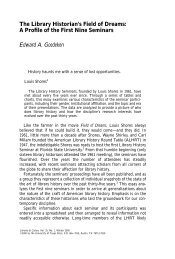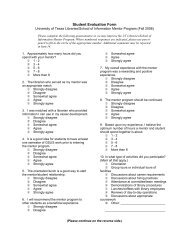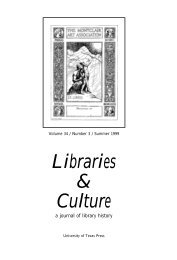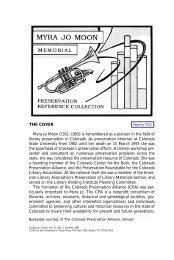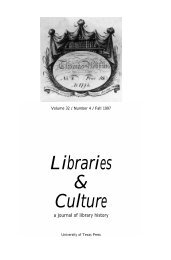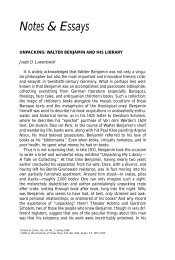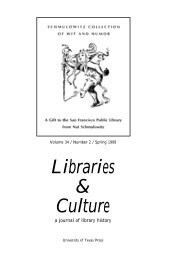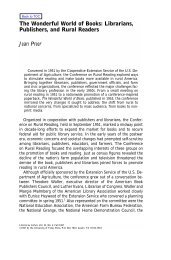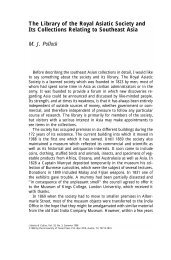Full issue (pdf file, 973 kb) - School of Information - The University of ...
Full issue (pdf file, 973 kb) - School of Information - The University of ...
Full issue (pdf file, 973 kb) - School of Information - The University of ...
You also want an ePaper? Increase the reach of your titles
YUMPU automatically turns print PDFs into web optimized ePapers that Google loves.
Future: <strong>The</strong> Foundations <strong>of</strong> Library and <strong>Information</strong> Services in the Post-Industrial Era<br />
(Norwood, N.J.: Ablex Publishing, 1993).<br />
121. Andrew Abbott, <strong>The</strong> System <strong>of</strong> Pr<strong>of</strong>essions: An Essay on the Division <strong>of</strong> Expert<br />
Labor (Chicago: <strong>University</strong> <strong>of</strong> Chicago Press, 1988).<br />
122. Thomas Augst, “<strong>The</strong> Business <strong>of</strong> Reading in Nineteenth-Century<br />
America: <strong>The</strong> New York Mercantile Library,” American Quarterly 50 (June 1998):<br />
267–305.<br />
123. I review this literature in “Out <strong>of</strong> Sight, Out <strong>of</strong> Mind: Why Don’t We<br />
Have Any <strong>School</strong>s <strong>of</strong> Library and Reading Studies?” Journal <strong>of</strong> Education for Library<br />
and <strong>Information</strong> Science 38 (Fall 1997): 314–26, and “<strong>The</strong>oretical Foundations for<br />
Analyzing Print Culture as Agency and Practice in a Diverse Modern America,”<br />
in James P. Danky and Wayne A. Wiegand, eds., Print Culture in a Diverse America<br />
(Urbana: <strong>University</strong> <strong>of</strong> Illinois Press, 1998), 1–13.<br />
124. Steven Mailloux, Interpretative Conventions: <strong>The</strong> Reader in the Study <strong>of</strong> American<br />
Fiction (Ithaca, N.Y.: Cornell <strong>University</strong> Press, 1982); Jane Tompkins, Sensational<br />
Designs: <strong>The</strong> Cultural Work <strong>of</strong> American Fiction, 1790–1860 (New York: Oxford<br />
<strong>University</strong> Press, 1986); Cathy Davidson, Revolution and the Word: <strong>The</strong> Rise <strong>of</strong> the<br />
Novel in America (New York: Oxford <strong>University</strong> Press, 1986); Ronald J. Zboray, A<br />
Fictive People: Antebellum Economic Development and the American Reading Public (New<br />
York: Oxford <strong>University</strong> Press, 1993); Michael Denning, Mechanic Accents: Dime<br />
Novels and Working-Class Culture in America (New York: Verso, 1987); Janice Radway,<br />
Reading the Romance: Women, Patriarchy, and Popular Literature (Chapel Hill:<br />
<strong>University</strong> <strong>of</strong> North Carolina Press, 1991).<br />
125. Michel Foucault, Archeology <strong>of</strong> Knowledge and the Discourse <strong>of</strong> Language<br />
(New York: Pantheon, 1972); Jurgen Habermas, <strong>The</strong> <strong>The</strong>ory <strong>of</strong> Communication<br />
Action, vol. 1, Reason and the Rationalization <strong>of</strong> Society (Boston: Beacon, 1984);<br />
Antonio Gramsci, Prison Notebooks, vol. 1 (New York: Columbia <strong>University</strong> Press,<br />
1992); Barbara Hernnstein Smith, Contingencies <strong>of</strong> Value: Alternative Perspectives for<br />
Critical <strong>The</strong>ory (Cambridge, Mass.: Harvard <strong>University</strong> Press, 1988); Michel de<br />
Certeau, <strong>The</strong> Practice <strong>of</strong> Everyday Life (Berkeley: <strong>University</strong> <strong>of</strong> California Press,<br />
1984).<br />
126. Wolfgang Iser, <strong>The</strong> Act <strong>of</strong> Reading: A <strong>The</strong>ory <strong>of</strong> Aesthetic Response (Baltimore:<br />
Johns Hopkins <strong>University</strong> Press, 1978); Stanley Fish, Is <strong>The</strong>re a Text in This Class?<br />
<strong>The</strong> Authority <strong>of</strong> Interpretive Communities (Cambridge, Mass.: Harvard <strong>University</strong><br />
Press, 1980); Benedict Anderson, Imagined Communities: Reflections on the Origins and<br />
Spread <strong>of</strong> Nationalism (New York: Verso, 1991); Janice A. Radway, A Feeling for Books:<br />
<strong>The</strong> Book-<strong>of</strong>-the-Month Club, Literary Taste, and Middle-Class Desire (Chapel Hill:<br />
<strong>University</strong> <strong>of</strong> North Carolina Press, 1997). See also Jonathan Boyarin, ed., <strong>The</strong><br />
Ethnography <strong>of</strong> Reading (Berkeley: <strong>University</strong> <strong>of</strong> California Press, 1993).<br />
127. Notable exceptions include Catherine S. Ross, “‘If <strong>The</strong>y Read Nancy<br />
Drew, So What?’: Series Book Readers Talk Back,” Library and <strong>Information</strong> Science<br />
Research 17 (Summer 1995): 201–36; Christine Pawley, “Better Than Billiards:<br />
Reading and the Public Library in Osage, Iowa, 1890–1895,” in Danky and<br />
Wiegand, eds., Print Culture in a Diverse America, 173–99; Larry E. Sullivan and<br />
Lydia C. Schurman, eds., Pioneers, Passionate Ladies, and Private Eyes: Dime Novels,<br />
Series Books, and Paperbacks (New York: Haworth Press, 1996); Cheryl Knott<br />
Malone, “Reconstituting the Public Library Users <strong>of</strong> the Past: An Exploration <strong>of</strong><br />
Nominal Record Linkage Methodology,” Journal <strong>of</strong> Education for Library and<br />
<strong>Information</strong> Science 39 (Fall 1998): 282–90.<br />
128. William Boyd, Jr., “Books for Young Businessmen: Mercantile Libraries in<br />
the United States, 1820–1865” (Ph.D. diss., Indiana <strong>University</strong>, 1975).<br />
33



